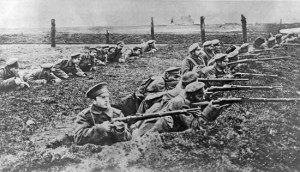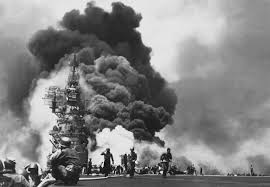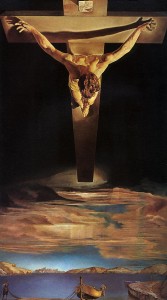As he came near and saw the city [of Jerusalem], he wept over it, saying, ‘If you, even you, had only recognized on this day the things that make for peace! But now they are hidden from your eyes. Indeed, the days will come upon you, when your enemies will set up ramparts around you and surround you, and hem you in on every side. They will crush you to the ground, you and your children within you, and they will not leave within you one stone upon another; because you did not recognize the time of your visitation from God.’ [Luke 19:41-44, NRSV]
[L & M] The Theater of war. [R] Christ of St John of the Cross, by Salvador Dali.
On Saturday 13 September 2014, Pope Francis went to Redipuglia in northern Italy, to commemorate the centenary of the start of the First World War. He went first to pray silently at the Austro-Hungarian Cemetery of Fogliano di Redipuglia. It is near the Italian War Memorial of Redipuglia, also known as the Memorial of the 100,000, the site of the second event of the Pope’s trip. There he celebrated Mass for those who died in the war.
The following day, 14 September, on the Feast day of the Exaltation of the Cross, the Holy Father appeared at the window of the study in the Apostolic Palace to pray the Angelus with the faithful and the pilgrims gathered in St. Peter’s Square.
The two occasions inspired thoughts on the ruinous destiny of humanity when left in human hands, in sharp contrast to the hope of salvation for humanity in the cross of Christ and world peace in the heart of God.
The Ruins Wrought by Wars
At Redipuglia, the Holy Father prayed for those who have died because of the First World War [28 July 1914 to 11 November 1918 28]. He noted the shocking numbers, estimated at almost 8 million young soldiers as well as almost 7 million civilians. People thought that was the turbulent time, but atrocities at such a grand scale did not stop there. Soon there was a Second World War [1939-1945] and the list continues today.
 Tens of millions of lives have been lost, properties destroyed, and memories forever scarred. All for what? Clashes of interests germinated in the heads of brainwashed ideologues, politicians and monarchs and enacted in the theater of war. Yet the victims, the ones who suffered, were usually not their sons and daughters whom they cushioned well from harm, but those whom they pressed into service attacking or defending territories, and the innocent ordinary people who were mere collateral damages in the statistics. You do not hear of a George W. Bush or a Dick Cheney, the war mongers, sending their own children to the front line.
Tens of millions of lives have been lost, properties destroyed, and memories forever scarred. All for what? Clashes of interests germinated in the heads of brainwashed ideologues, politicians and monarchs and enacted in the theater of war. Yet the victims, the ones who suffered, were usually not their sons and daughters whom they cushioned well from harm, but those whom they pressed into service attacking or defending territories, and the innocent ordinary people who were mere collateral damages in the statistics. You do not hear of a George W. Bush or a Dick Cheney, the war mongers, sending their own children to the front line.
So Pope Francis sums things up graphically for us:
- War is madness! Humanity as yet has not learned the lesson. “Whereas God carries forward the work of creation, and we men and women are called to participate in his work, war destroys. It also ruins the most beautiful work of his hands: human beings. War ruins everything, even the bonds between brothers. War is irrational; its only plan is to bring destruction: it seeks to grow by destroying.”
- The motives of war. The motives that drive the decisions for war are greed, intolerance and lust for power.
- An underlying attitude of indifference. An inhumane attitude of indifference underlies all decisions in going to war, an indifference seen in Cain’s response to God when asked the whereabouts of his brother whom he killed. “Why should I care? Am I my brother’s keeper?’ (cf. Gen 4:9). Behind it all, there is a “distorted passion” justified often by an ideology.
- We must learn to weep. “War does not look directly at anyone, be they elderly, children, mothers, fathers…. It is the task of the wise to recognize errors, to feel pain, to repent, to beg for pardon and to cry.” Like arms dealers, war-plotters need “a conversion from indifference to tears.” What the world needs is mindfulness of the victims of “senseless massacre” and “mindless wars”. “Humanity needs to weep and this is the time to weep.”
The Hope Wrought by Christ on the Cross
Pope Francis lamented humanity’s amnesia, our failure to learn the futilities of war, and our inhumane indifference towards colossal human cruelties and destructions. “When will we learn, when will we learn this lesson?” he asked repeatedly.
On the Feast of the Exultation of the Cross, Pope Francis invited everyone to look at Jesus Crucified for the answers.
We do not exalt a cross, the Pontiff explains. What we exalt is the Cross of Jesus. The difference is highlighted by our late professor of dogmatic theology in Louvain, Herman-Emiel Mertens, who titled his book on Christology “Not the Cross, But the Crucified”. The cross is an inhumane instrument of torture. Used on Jesus the wholly innocent one, the cross was cruel, absurd and meaningless. But, in the Cross of Jesus is revealed fully the love of God for humanity. The Evangelist John has understood this so well that he brilliantly affirmed that God’s love for humanity was attested by Jesus’ ultimate sacrifice on the cross. “For God so loved the world that he gave his only Son” [John 3:16].
But why was the cross of Jesus necessary in the first place? It was precisely because of the death-bound condition in which humanity was enslaved – greed, intolerance, lust, hatred, suffering, violence, evil and death – that the world needed a Saviour. When we contemplate the cross of Jesus, we realize, like the Centurion at the foot of the cross, that Jesus the Christ is the Saviour of the world for the way he lived and died – in steadfast fidelity to the work of advancement of the Kingdom of God. He stayed true to his mission from the Father to preach the Kingdom-values from one mountain (the Sermon on the Mount, Matthew 5-7) and to live it to the full all the way to the other mountain (Mount Calvary where he was crucified). He thereby showed humanity the feasibility of living faithfully the will of the Father in the evangelical values of the Kingdom in freedom and authenticity on the one hand and in solidarity and co-humanity on the other. He has shown the way to abundant and eternal life.
So in Pope Francis’ fruitful catechesis, we learn three lessons:
- The Cross of Jesus is the root of our salvation. Contemplating Jesus Crucified, we learn that while war only increases hatred, evil and death, these very same negativities are defeated by forgiveness and goodness. Hope is restored.
- With Jesus pinioned on the Cross, we encounter the flow of the mercy of the Father. In the face of the negative strength of evil, and despite everything, the Father embraces the whole world with mercy and love.
- On the Cross, Jesus shows the world the path of non-violence despite all atrocities. Jesus’ entire life and actions including his suffering death on the cross – his good-news-preaching-and-living from start to finish – was affirmed by the Father as the path towards the resurrection, and the way to reconciliation with God – that atonement (at-one-ment) with the Holy Trinity which is our eternal human salvation.
Exalting the Cross for Hope Restored
This, the Holy Father concludes, is why we exalt the Cross of Jesus:
- “We contemplate the sign of the infinite love of God for each and every one of us and the roots of our salvation. From that Cross flows the mercy of the Father who embraces the whole world. Through the cross of Christ, evil is overcome, death is defeated, life is given to us, hope is restored. The Cross of Jesus is our only true hope! This is important! Through the Cross of Christ hope is restored! That is why the Church ‘exalts’ the holy Cross, and that is why we Christians bless ourselves with the Sign of the Cross.”
Copyright © Dr. Jeffrey & Angie Goh, January 2014. All rights reserved.
You are most welcome to respond to this post. Email your comments to jeffangiegoh@gmail.com. You can also be dialogue partners in this Ephphatha Coffee-Corner Ministry by sending us questions for discussion.



